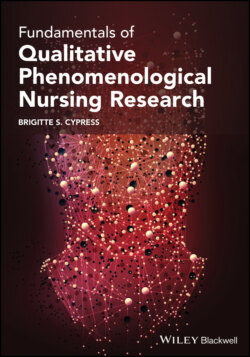Читать книгу Fundamentals of Qualitative Phenomenological Nursing Research - Brigitte S. Cypress - Страница 11
Оглавление
Acknowledgments
I would like to sincerely thank Wiley for publishing this book.
I gratefully acknowledge permission from Sage, Taylor and Francis, Springer, BMJ Publishing Group, and Wiley for the following sources:
1 Alexander, R.K., Diefenbeck, C.A., and Brown, C.B. (2015). Career choice and longevity in U.S. psychiatric–mental health nurses. Issues in Mental Health Nursing 36 (6): 447–454.
2 Creswell, J.W. and Poth, C.N. (2017). Qualitative Inquiry & Research Design: Choosing Among Five Approaches, 4e. Sage Publications.
3 Elliott, R.A, Lee, C.Y., Beanland, C. et al. (2017). Development of a clinical pharmacy model within an Australian home nursing service using co‐creation and participatory action research: the Visiting Pharmacist (ViP) study. BMJ Open 7: e018722, 1–10.
4 Giorgi, A. (2008). Concerning a serious misunderstanding of the essence of the phenomenological method in psychology. Journal of Phenomenological Psychology 39: 33–58.
5 Patton, M.Q. (2014). Qualitative Research and Methods: Integrating Theory and Practice, 4e. Sage Publications.
6 Silverman, D. (2005). Doing Qualitative Research, 2e. Sage Publications.
7 St. John, W. and Johnson, P. (2000). The pros and cons of data analysis software for qualitative research. Journal of Nursing Scholarship 32 (4): 393–394.
8 Tolman, D., Hirschman, C., and Impett, E.A. (2005). There is more to the story: the place of qualitative research on female adolescent sexuality in policy making. Sexuality Research and Social Policy: Journal of NSRC 2 (4): 4–17.
9 Whittemore, R., Chase, S.K., and Mandle, C.L. (2001). Validity in qualitative research. Qualitative Health Research 11 (2): 117–132.
Thank you to Dr. Max van Manen for the great ideas in his two books:
1 Van Manen, M. (2014). Phenomenology of Practice: Meaning‐Giving Methods in Phenomenological Research and Writing. Left Coast Press.
2 Van Manen, M. (1990). Researching Lived Experience: Human Science for an Action Sensitive Pedagogy. State University Press.
I am grateful to Dr. Janice Morse for her qualitative books:
1 Morse, J. (2012). Qualitative Health Research: Creating a New Discipline. Left Coast Press.
2 Morse, J. (2012). Qualitative Health Research: Creating a New Discipline, 1e. Routledge.
3 Morse, J., Swanson, J.J., and Kuzel, A.J. (2001). The Nature of Qualitative Evidence. Sage Publications.
4 Morse, J. (1997). Completing a Qualitative Project: Details and Dialogue. Sage Publications.
5 Morse, J. and Field, P.A. (1995). Qualitative Research Methods for Health Professionals, 2e. Sage Publications.
6 Morse, J. (1994). Critical Issues in Qualitative Research Methods. Sage Publications.
7 Morse, J. (1991). Qualitative Nursing Research: A Contemporary Dialogue. Sage Publications.
My sincere gratitude to Dr. Kathleen Ahern Gould for her ideas and suggestions on topics to write and present to our journal audience. The qualitative research methodological article series I wrote for DCCN inspired me to write this book. Thank you also for writing Chapter 7 on Publishing Qualitative Phenomenological Research Findings. I am thankful to Dr. Vickie Miracle. I published my first article in that same journal when she was the chief editor. I learned a lot, and honed my writing skills through the years working with both of them. Coincidentally, Wiley (which publishes DCCN) accepted my book proposal when I submitted it. I think this is meant to be – that I continue to be working with this great group of experts, and this publishing company.
My heartfelt thanks to Dr. Keville Frederickson and Dr. Donna Nickitas for their mentorship, guidance, support, and friendship through the years. You have always been there for me.
Thank you to Dr. Meriam Caboral‐Stevens for the views and thoughts we share, and for your friendship.
The ideas for this text I have pondered, presented, and discussed with colleagues and friends from the International Coalition of North American Phenomenologists (ICNAP), the International Philosophy of Nursing Society (IPONS), and the International Human Science Research Conference (IHSRC) group over the years. I am indebted to all of you who listened, questioned, argued, and gave suggestions for my work. I learned a lot from you all.
To all my research students, for whom I have learned so much – my reason for writing this book is YOU!
